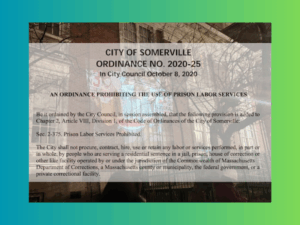The Somerville Fair Housing Commission compiled a Fair Housing questionnaire for mayoral and City Council candidates to respond to. The Somerville Wire will be publishing the completed questionnaire in a six part series. The sixth and last is included below.
(Somerville Wire) – What reforms do you see as feasible to ensure that older housing stock is maintained in a manner that supports the health and safety of all residents, including low-income residents?
Katjana Ballantyne, Candidate for Mayor:
I’ll use all of the tools that the city has, such as zoning, for better pedestrian ways, accommodating people with disabilities. Funding and incentives for owners and landlord to provide adaptive reuse accommodation, to eliminate lead paint hazards, and for converting housing from fossil fuel heating and air-conditioning to clean energy sources. I will work hard for funding of all these efforts as well as affordability!
Mary Cassesso, Candidate for Mayor:
Bringing together our offices of Sustainability and Housing Stability, I would promote funding for energy-efficient building systems that use cleaner energy, are more efficient, ensure better air quality and health outcomes, and lower utility bills for residents. I would work with ISD to make sure older units are meeting health and safety standards. In addition to health and safety, I would work to avoid displacement from older housing stock at risk of condo conversion through non profit acquisition, resident-led right of first refusal acquisition, or other strategies to support Somerville community members in remaining here. Upon acquisition by a non-profit or other group, buildings can be rehabbed funded by affordable housing resources to ensure long-term quality homes and affordability.
Will Mbah, Candidate for Mayor:
Most of the older housing stock homes and apartments are also public housing where the state and federal government control a lot of the aid and money to maintain the properties. Building regional partnerships and working with other cities and towns to pressure the state is one strategy I would pursue on that front. In cases where more direct funding isn’t available for retrofitting, like in the case of the environmental justice issue at the Mystics (noise and air pollution from I93 and McGrath, one reform I am interested in implementing involves a pilot program that provides residents who cannot afford to retrofit their homes with a free HEPA indoor filters. We also must upgrade homes by removing toxic paints and lead pipes. Again, this is something the city can fund for low-income residents. I think the city can put together bold programs that incentivize this work for homeowners and landlords.
Charlotte Kelly, Candidate for City Council At Large:
I would work with the Mayor’s office to establish a fund that can be used to retrofit homes to meet people’s mobility and sensory needs, which could be administered by the Commission for Persons with Disabilities. We can provide assistance to property owners looking to optimize energy efficiency and weatherize their properties, while ensuring the costs are not offset onto tenants, patrons, and workers. This will require serious resources being spent by and for our City so I will work with all City officials to push for expanding the MLF (Municipal Lending Facility) to access funding for these programs. Lastly, we should have an annual audit of ISD enforcement of health and safety violations to ensure transparency around providing residents with fair and healthy homes.
Justin Klekota, Candidate for City Council At Large:
I would work with the Mayor’s office to establish a fund that can be used to retrofit homes to meet people’s mobility and sensory needs, which could be administered by the Commission for Persons with Disabilities. We can provide assistance to property owners looking to optimize energy efficiency and weatherize their properties, while ensuring the costs are not offset onto tenants, patrons, and workers. This will require serious resources being spent by and for our City so I will work with all City officials to push for expanding the MLF (Municipal Lending Facility) to access funding for these programs. Lastly, we should have an annual audit of ISD enforcement of health and safety violations to ensure transparency around providing residents with fair and healthy homes.
Kristen Strezo, Councilor At Large:
– As City Councilor, I am a fierce advocate of the 100 Homes Project (expanded 2021 proposal to 2,000 Homes) that works to combat the displacement of specifically low-income residents. I’m working with SCC to discuss what maintenance could look like in the 100 Homes Program in the years ahead. In the Affordable Housing Trust Fund, and the Housing and Community Development Committee (HCD), we have been discussing how to best support the SCC and the 100 Homes Program in the future. Going forward, I’m very interested in exploring apprenticeship programs to create jobs while urgently making home repairs for SCC residents who need assistance.
– As a City Councilor, I am also doing my part to guide the Somerville Community Land Trust (SCLT) into reality. I have been a big supporter (and fan!) of the SCLT. I have worked for quarterly check-ins of the SCLT with the HCD Committee, asking how the Council and the City can best support its efforts. I see this to include continued funding through the city so the SCLT can take it to the next phase.
– Expanding the stock of 3 and 4 bedroom units immediately for low income rental and low income homebuyer programs to reflect demand.
– I have also fought for the Tenant’s Right to Purchase and, in light of the pandemic, have advocated for Rent Stabilization measures in Somerville and the Commonwealth. Many of the policies such as Rent Stabilization and other Fair Housing protections, like the Right To Counsel are currently in progress at the State House, and I want to ensure that the Somerville City Council is guiding them to victory.
Tracey Pratt, Candidate for City Council At Large:
As city councilor I would make separate ordinances that apply to older housing stock that is not deemed historic. Older homes require a different kind of care than more modern homes and I support reform that will address issues that would compromise the health and safety of anyone who resides in them.
Virginia Hussey, Candidate for City Council At Large:
Section 8 voucher inspections need to be taken seriously, and tenants should be protected. When I was living in an apartment in Somerville it failed inspection due to black mold three times. The landlord wasn’t paid, but my son and I were still living in the apartment. We had no place to go, and my son got sick from the mold. We were essentially trapped in this unsafe situation. When I found a new place to live, I also didn’t receive my security deposit back and didn’t know I had the right to claim it. If elected, I will explore funding sources to help small property owners make their units more accessible to people with disabilities, help landlords make repairs to pass Section 8 inspections and help alleviate the burden on landlords and tenants. The new program that provides money to landlords is a great start, but we need to do more to take the perceived financial risk off everyone and make landlords more open to equitable renting practices.
Willie Burnley, Jr., Candidate for City Council At Large:
For all the beauty that comes with being a historic city with one of the oldest roadways in the United States, there is a fair share of dilapidation and aging that comes along with it. I would be interested in exploring mandating annual, independent assessments of properties from experts, the results of which are shared with the tenants, the property owner, and perhaps the City itself though that would ultimately be a lot of data. As a renter, often the burden is put upon us to monitor our building’s safety and soundness. However, even this year, I learned that the property I live in had improperly installed equipment that helped lead to two gas leaks, which was only discovered because my roommates noticed the smell. A proper inspection, earlier on, could have avoided that situation.
One policy that I am very interested in exploring would be a Somerville Green New Deal, which would have the goal of transforming our community to be carbon neutral by 2030. One component of that would be green retrofitting of our buildings, which I believe will both improve the health and safety of residents overall as well as save them money over the long-term. The heat in my first apartment in Somerville ran on oil and refilling our heater was very costly.
We, of course, need to better fund ISD so that more inspections can be done and we can tackle our rat problem more robustly. I am glad that recent reforms around baiting have expanded the power to deal with this issue from solely at the discretion of homeowners to include renters.
JT Scott, City Councilor, Ward 2:
I’m glad that there is a de-leading grant/assistance program (“Lead Paint Safe Somerville”), but I don’t believe it is particularly well advertised or utilized. I’d like to see it continued and expanded; I’d also be very interested in a corresponding program for ADA compliance and reasonable accommodations for people with disabilities. When faced with units which have horrific health and safety violations, inspectors and community agencies like CAAS sometimes face terrible choices between requiring massive renovations which will displace tenants who may not be able to otherwise find housing, or “looking the other way” and allowing these conditions to persist long after they’ve become unsafe; I’d like to see us have a more robust response strategy in place for these awful situations. But perhaps the single move with the broadest impact that we could make in Somerville is increasing the staffing levels in Inspectional Services Department, particularly with violation and building inspectors who have direct experience with the constellation of regulations affecting Fair Housing that go beyond basic building codes. ISD is currently understaffed and straining at capacity to address the high volume of complaints they receive, and followup on violations as well as guidance to property owners on how to remedy violations is limited to say the least. We need to dramatically expand ISD’s capacity in this area.
Ben Ewen-Campen, City Councilor, Ward 3:
Somerville needs continue to develop and expand as many safety and accessibility retrofits as possible – the fundamental limitation is cost: it is extremely expensive to retrofit older buildings, and without subsidy it is unlikely to happen at scale. This is why the State and Federal recovery money, together with the State’s new climate bill and the pending Federal infrastructure bill, is such an absolutely essential opportunity for Somerville. These scale of these resources have the potential to make a real difference, and it will be our job to put these funds into well-crafted programs that lead property owners to maintain and retrofit buildings for energy efficiency as well as safety and accessibility.
Beatriz Gómez Mouakad, City Council candidate, Ward 5:
The challenge with encouraging the upkeep of older housing stock is the cost of renovations which in a very active construction market and is experiencing inflation rates as high as 10% (Currently due to COVID) or has averaged in the past 5%/6%. Renovations will often trigger rental increases and overall property tax increases. There should be a property tax relief for property owners who upgrade their properties and avoid rental increases. (i.e. maintain their units affordable) The other challenge with upkeep is ensuring the right type and safe renovations are completed. The City should create a resource center for property owners which would include information regarding current code compliance, zoning compliance, energy improvements and available rebates and technical assistance for guiding property homeowners through a home renovation/improvements.
Tessa Bridge, City Council candidate, Ward 5:
In order to ensure that older housing stock is maintained adequately, we need to increase ISD enforcement, including reforming ISD to work better for landlords and tenants. Part of this needs to be requiring random inspections to be done with regularity to ensure that buildings are being maintained. The city can create a registry of landlords who engage in discriminatory practices and do not maintain buildings and release that information publicly so that tenants (and their legal council) are aware. We can also provide subsidies from the city to support retrofitting buildings to be safe and healthy as well as net-zero. These programs can be part of a larger green new deal designed to both improve housing, particularly for low-income and BIPOC residents, and create green jobs.
Todd Easton, City Council candidate, Ward 5:
The City should mandate—and be vigilant about enforcing—inspections of larger older buildings, particularly in light of recent tragic events in Florida. We should implement systematic reviews and tracking of our housing stocks organized by safety metrics (as identified by expert professionals). More urgently, the City should consider streamlining the way residents can report emergency safety concerns.
Alexander Anderson, City Council candidate, Ward 7:
The city, in partnership with the state, should proactively evaluate the condition of existing houses – starting with units that house people and families historically discriminated against – and enact plans to make the necessary improvements using existing government programs (like MassSaves) and creating new programs that will help modernize the housing stock.
Becca Miller, City Council candidate, Ward 7:
Connecting the Inspectional Services Department to work in a more responsive manner with homeowners and tenants is one strategy to better maintain the current older housing stock. The city should require ISD to perform random inspections to ensure compliance with current regulations and laws. The fair housing commission could also create a list of landlords with frequent fair housing complaints and post it to their webpage and facebook page to share with potential tenants and increase compliance with the laws. I also support passing a Somerville Green New Deal to retrofit the city’s residential buildings and make them net zero carbon – many older homes still run on oil heat like the apartment I used to live in, and we need to transition away from oil and gas to clean electricity. We can do this through advocating changing the MassSave program to incentivize transitioning from methane gas to electricity, and building geothermal micro districts.
Judy Pineda Neufeld, City Council candidate, Ward 7:
The City of Somerville must ensure that our public housing is adequately maintained. I would increase funding for the upkeep of existing public housing, and work with the tenants associations in Ward 7 to ensure there is accountability when management does not do proper maintenance of its buildings. I will also support the needs of the tenants at Clarendon Hill during its redevelopment, and ensure the agreement negotiated between the tenants union and the developer is upheld, including the right of return for all residents. As City Councilor I will also explore ways to incentivize landlords to retrofit older housing so renters and buyers across the City have safer and more accessible housing options.
Maria Koutsoubaris, City Council candidate, Ward 7:
The changes to the current ordinance that restrict certain processes of purchase and sale of an individual homeowner. The tax break increases for elder and disabled homeowners. The ISD reform that makes homeowner friendly usage more applicable. I particularly have interests in the proposed H.A.N.D Program that Candidate William Tauro is proposing as part of his platform.







